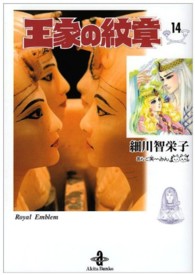- ホーム
- > 洋書
- > 英文書
- > History / World
Full Description
The Dialogue of Ipuwer and the Lord of All is one of the major works from the golden age of Egyptian literature, the Middle Kingdom (c. 1980-1630 BC). The poem provides one of the most searching explorations of human motivation and divine justice to survive from Ancient Egypt, and its stark pessimism questions many of the core ideologies that underpinned the Egyptian state and monarchy. It begins with a series of laments portraying an Egypt overwhelmed by chaos and destruction, and develops into an examination of why these disasters should happen, and who bears responsibility for them: the gods, the king, or humanity.
This volume provides the first full literary analysis of this poem for a century. It provides a detailed study of questions such as: its date of composition; its historicity; the identity of its protagonists and setting; its reception history within Egyptian culture; and whether it really is a unified literary composition, or a redacted collection of texts of heterogenous origin.
Providing a new reading of the poem, within the cultural milieu that produced it, this volume will be essential reading for scholars and students of Ancient Egyptian literature, the Old Testament and comparative religion.
Contents
1: Introduction
2: Literary aspects of Ipuwer
2.1: Description of text
2.2: Survey of previous research
2.3: Textual unity
2.4: Dating
2.5: Reception
2.6: Speakers, section boundaries, and setting of the poem
2.7: Genre and intertext
2.8: Literary style
2.9: Style, structure, and meaning
2.10: Towards a reading of the poem
3: Commentary
3.1: Commentary on Lament I
3.2: Interpretation of Lament I
3.3: Commentary on Lament II
3,4: Interpretation of Lament II
3.5: Commentary on Lament III
3.6: Interpretation of Lament III
3.7: Commentary on Injunction I
3.8: Interpretation of Injunction I
3.9: Commentary on Injunction II
3.10: Interpretation of Injunction II
3.11: Commentary on Injunction III
3.12: Interpretation of Injunction III
3.13: Commentary on Reproach I
.14: Interpretation of Reproach I
3.15: Commentary on the Meditation
3.16: Interpretation of the Meditation
3.17: Commentary on Reply I
3.18: Interpretation of Reply I
3.19: Commentary on Reproach II
3.20: Interpretation of Reproach II
3.21: Commentary on Reply II
3.22: Interpretation of Reply II
3.23: Excursus: the jottings of 17A.1-3
4: Continuous transliteration and translation of Ipuwer








